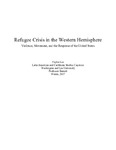Refugee Crisis in the Western Hemisphere: Violence, Movement, and the Response of the United States

View/
Author
Lee, Taylor Douglas
Subject
Washington and Lee University -- Capstone in Latin American and Caribbean Studies
Political refugees
Refugees -- Government policy
Human rights -- Government policy
Central America
United States
Metadata
Show full item recordDescription
Taylor Douglas Lee is a member of the Class of 2018 of Washington and Lee University. Thesis; [FULL-TEXT FREELY AVAILABLE ONLINE] The aim of this paper rests on the argument that the nature of the violent conflict in the Northern Triangle of Central America necessitates that those who are fleeing the region should be considered asylum-seekers or refugees. To organize my argument, I begin by providing an overview of the terminology that is used to categorize general immigration and distinguish migrants from refugees and asylum-seekers. I proceed to provide a brief history of Central American criminal organizations, their destabilization of governments in the Northern Triangle, and the general violence that they introduce into their societies. The paper then analyzes the general U.S. responses to the influx of asylum-seekers catalyzed by the violent situation in the Northern Triangle and the general infectiveness of those responses. Subsequently, I describe the asylum-seeking process for Central Americans who hope to attain refuge in U.S. territory and the ways in which this system allows for inhumane and often illegal treatment of asylum-seekers. Finally, I review the international and domestic laws and agreements that the U.S. has violated in their response to the Central American refugee crisis. The various analyses, I contend, lead to the conclusion that the U.S. has failed to treat asylum-seekers and refugees humanely and has violated several international laws and agreements by its reaction to the crisis. [From Introduction] Taylor Lee